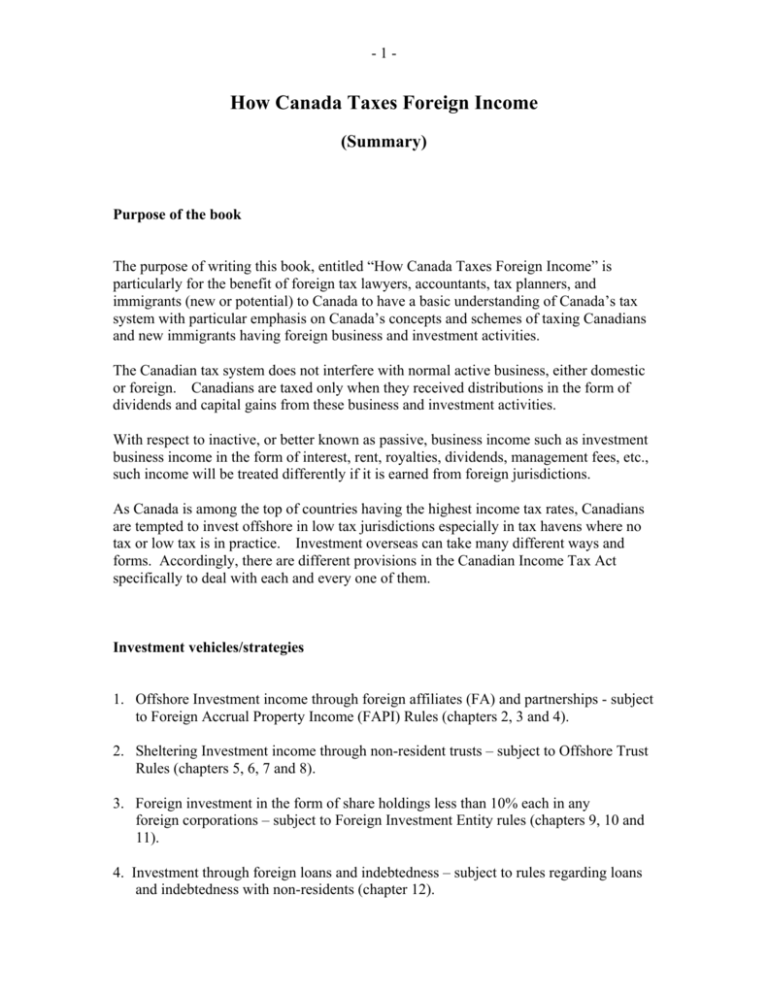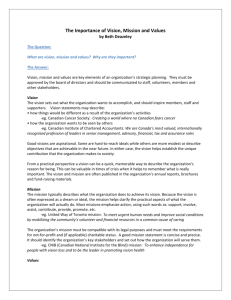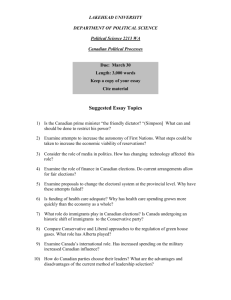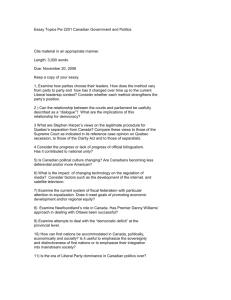
-1-
How Canada Taxes Foreign Income
(Summary)
Purpose of the book
The purpose of writing this book, entitled “How Canada Taxes Foreign Income” is
particularly for the benefit of foreign tax lawyers, accountants, tax planners, and
immigrants (new or potential) to Canada to have a basic understanding of Canada’s tax
system with particular emphasis on Canada’s concepts and schemes of taxing Canadians
and new immigrants having foreign business and investment activities.
The Canadian tax system does not interfere with normal active business, either domestic
or foreign. Canadians are taxed only when they received distributions in the form of
dividends and capital gains from these business and investment activities.
With respect to inactive, or better known as passive, business income such as investment
business income in the form of interest, rent, royalties, dividends, management fees, etc.,
such income will be treated differently if it is earned from foreign jurisdictions.
As Canada is among the top of countries having the highest income tax rates, Canadians
are tempted to invest offshore in low tax jurisdictions especially in tax havens where no
tax or low tax is in practice. Investment overseas can take many different ways and
forms. Accordingly, there are different provisions in the Canadian Income Tax Act
specifically to deal with each and every one of them.
Investment vehicles/strategies
1. Offshore Investment income through foreign affiliates (FA) and partnerships - subject
to Foreign Accrual Property Income (FAPI) Rules (chapters 2, 3 and 4).
2. Sheltering Investment income through non-resident trusts – subject to Offshore Trust
Rules (chapters 5, 6, 7 and 8).
3. Foreign investment in the form of share holdings less than 10% each in any
foreign corporations – subject to Foreign Investment Entity rules (chapters 9, 10 and
11).
4. Investment through foreign loans and indebtedness – subject to rules regarding loans
and indebtedness with non-residents (chapter 12).
-25. Investment through foreign affiliates and related companies using transactions under
non-arm’s length terms – subject to Transfer Pricing Rules (chapter 13).
6. Investment through schemes designed to avoid immediate Canadian tax or avoid
paying Canadian tax at all – subject to General Anti-Avoidance Rules (chapter 14).
7
For compliance purposes, Canadians are required to file information returns annually
regarding the kind of foreign assets and investments they have offshore including
assets transferred or loans advanced to non-resident trusts and non-arm’s length
transactions between Canadians and non-resident persons – Foreign Reporting
Requirements (chapter 15).
8. Emigration from Canada – subject to departure tax (chapter 16).
Immigration to Canada will usually have significant and unexpected consequences to the
immigrant. After becoming resident in Canada, the immigrant will be subject to
Canadian taxation on his world income, i.e. from all sources, both within and outside
Canada. Because Canada imposes high tax rates and enforces the tax laws relatively
strictly, the new immigrant will face a greater potential tax burden in Canada than he did
in his former country of origin. However, the Canadian tax system also offers plenty
opportunities, particularly in the area of foreign affiliate rules, to reduce the tax to be paid
by immigrants provided that appropriate steps are taken well before immigration.
Foreign accounting and tax professionals, having potential immigrants to Canada should
be familiar with all the above rules in order to provide responsible and accurate
information for their clients, and to make a comprehensive tax planning before their
clients immigrating to Canada.
Foreign Affiliate (FA) Rules
To defer, if not totally avoid, Canadian tax, Canadians attempt to offshore their income
using foreign affiliates. The concept of the foreign affiliate was first introduced in 1972
and became effective for the 1976 and subsequent taxation years as a method to combat
what the government regarded as the undue avoidance or deferral of Canadian tax by
Canadian taxpayers and newly landed immigrants in respect of their foreign-source
investment income earned through foreign subsidiaries and other foreign affiliates
incorporated or based in low-tax or no tax jurisdictions. As long as they derived their
income from sources outside Canada, they were not subject to Canadian tax unless or
until their income was paid or became payable to a Canadian resident by way of dividend,
interest, royalty or other form of income payment.
-3The greatest advantage of having a foreign affiliate in the international business setting is
to repatriate foreign profits back to Canada tax free under certain conditions, for example,
if a foreign affiliate carries on an active business in a designated treaty country (i.e. a
country with which Canada has a tax treaty). The after-tax profit is included in a pool
called “exempt surplus”. If the repatriation of profit in the form of dividend was paid out
of the “exempt surplus” pool to a Canadian corporate shareholder, such dividend is
included in its income and the same amount is allowed to be deducted in computing its
taxable income. In other words, the dividend is not subject to Canadian tax if received by
a Canadian corporate shareholder.
Taxable surplus pool includes all of the foreign affiliate’s other income, including active
business income earned in non-designated treaty countries. Dividends out of the taxable
surplus pool are subject to Canadian tax, and foreign tax credits are available for any
foreign withholding taxes on the dividends and for any underlying foreign taxes paid by
the foreign affiliate to its foreign jurisdictions on the income out of which the dividends
were paid. Dividends paid by a foreign affiliate are prescribed by the Canadian Income
Tax Act (the ITA) to be first come out from Exempt Surplus and then Taxable Surplus.
When these surplus pools are completely exhausted, any further dividends from the
foreign affiliate is considered to be paid out of pre-acquisition surplus which is
considered to be return of capital.
Any dividends paid by a foreign affiliate to a Canadian individual taxpayer will be
considered to be paid out of taxable surplus and therefore subject to Canadian tax
regardless of from what surplus pool the dividends were paid. However, a foreign tax
credit up to 15% of the dividend is allowed as a deduction against the Canadian federal
tax payable. Any excess will also be allowed but as a deduction in computing the
individual’s taxable income.
Foreign affiliate rules provide tax relief and deferral of Canadian tax on active business
income only to corporate Canadian parents or corporate partnerships but not individuals.
Hence new immigrants to Canada should incorporate a new holding company in Canada
to hold foreign active business operations, and under certain conditions, to hold foreign
investment either before or after they become landed immigrants.
Foreign Accrual Property Income (FAPI)
A Canadian shareholder of a controlled foreign affiliate is required to include in income
an amount (determined by the Canadian shareholder’s participating percentage in the
foreign affiliate) of the CFA’s inactive income on current basis (i.e. FAPI) regardless of
whether or not the passive income is being distributed to the Canadian shareholder.
To understand FAPI rules, it is important to recognize what is a controlled foreign
affiliate (CFA). A controlled foreign affiliate of a taxpayer means that a foreign
corporation not only is the foreign affiliate of the taxpayer but also is controlled either by
the taxpayer alone or with shareholders (resident or non-resident) related to the taxpayer
-4and not more than four other Canadian shareholders and their related shareholders
(resident or non-resident). Hence a foreign corporation which is a foreign affiliate of a
Canadian taxpayer can be easily caught by the Foreign Affiliate Rules to be deemed as a
controlled foreign affiliate of the Canadian taxpayer.
There are four common sources of FAPI which include:
-
inactive business income from property, such as income from portfolio
investment and income from investment business,
-
business income deemed to be income other than active business income,
-
insurance, interest, rentals and service income which has a Canadian source,
and
-
net taxable capital gains from non-excluded property (gains from disposition
of excluded property are generally considered as active business income).
Notes: Excluded property means property used to gain or produce income
from an active business.
Active Business
Active business means any business of a foreign affiliate except investment business and
any business deemed by Subsection 95(2) not to be an active business.
Investment Business
Investment business is a business the principal purpose of which is to derive income from
property (such as interest, dividends, rents, royalties, etc.), income from insurance and
reinsurance of risks, income from factoring accounts receivable, or profits from
disposition of investment property.
Some investment business is specifically excluded from investment business if the
business was carried on principally with arm’s length persons as a foreign bank, trust
company, credit union, insurance corporation, a trader or dealer in securities or
commodities, development of real estate for sale, the lending of money, leasing of
property, or the insurance and reinsurance of risks, and employed the equivalent of more
than five employees full time in the active conduct of the business. If an investment
business satisfies the activity test and number of employee test, it is considered as an
active business and its income will not be subject to FAPI rules.
-5Purpose of FAPI Rules
The main purpose of FAPI rules is to prevent Canadian taxpayers or new immigrants
from using tax haven corporations to defer or possibly to avoid Canadian tax. FAPI
rules were first introduced in 1972 along with foreign affiliate rules. Because of
complexity in their applications and other reasons, they are effective only for 1976 and
subsequent taxation years.
The following diagram shows the effect of FAPI legislation introduced in 1972 and
became effective after 1975:
Explanations
Before 76
After FAPI
Legislation
Investment income earned by OPCO-1
Not taxed
Taxed in Canco
On current basis
Dividends from active business income
earned and paid by OPCO-2 to
CANCO through Foreign Holdco
Not taxed
Not taxed
Dividends distributed by OPCO-1 to
CANCO through Foreign Holdco
Not taxed
Taxed
-6The following diagrams show what kind of income constitutes FAPI and what constitutes
non-FAPI:
-7How FAPI Rules Work
In summary, the foreign affiliate rules deal with foreign corporations earning active
business income while FAPI rules deal with foreign corporations earning inactive
business income or property income and income other than active business income. The
FAPI rules have the effect of subjecting the Canadian shareholders (individual or
corporation) of a controlled foreign affiliate to current tax on their pro rata share (better
known as participating percentage) of the foreign affiliate’s FAPI.
The rules governing the taxation of the income of a foreign affiliate of a Canadian require
every Canadian resident taxpayer to include in his income for a taxation year the
participating percentage of FAPI of every share owned by the taxpayer in a controlled
foreign affiliate. Such inclusion occurs whether or not there has been an actual payment
or distribution to the taxpayer of all or any part of the affiliate's FAPI during the taxation
year. The provision effectively treats the income of the affiliate as having been earned
directly by the Canadian resident taxpayer, thereby removing the advantage of creating
the foreign entity to hold the investment.
Essentially FAPI is income from property or from a business other than an active
business, including taxable capital gains arising from the disposition of property that is
not used in an active business. The income imputation under subsection 91(1) operates
in a series of steps or calculations: The taxpayer first identifies any foreign affiliates
which he controls. The FAPI of a controlled foreign affiliate must be calculated and
included in the taxpayer’s income. In case the controlled foreign affiliate earns active
business income as well as FAPI, then the active business income and FAPI should be
calculated separately. The taxpayer then determines his participating percentage in each
CFA and any subsidiaries of a CFA. Finally the taxpayer must apply his participating
percentage to the FAPI of such affiliates and include the amount in his income for
Canadian tax purposes. However, the taxpayer is entitled to a deduction in computing
his taxable income for the applicable foreign accrual tax on the FAPI. To avoid double
taxation, the taxpayer’s cost of investment in the CFA is required to be adjusted upward
to reflect the net amount of FAPI inclusion. When the same amount of FAPI was
distributed as dividend to the taxpayer later on, the taxpayer’s cost of investment in the
CFA will be adjusted downward in the same amount to neutralize the previous FAPI
inclusion effect.
Business Deemed Inactive Business
The following business is deemed by specific provisions of the Act to be inactive
business, such as:
(a)
Canadian sourced service,
-8(b)
Offshore purchasing profits,
(c)
Insurance of Canadian risks, and
(d)
Canadian source interest and leasing.
Except the business at (a) above, the deeming rules will not apply if more than 90% of
the foreign affiliate’s gross revenue is derived directly or indirectly from arm’s length
non-residents. In addition, the business income at (b) above will be deemed active
business income if the property was produced or processed in the country in which the
foreign affiliate is incorporated and in which its business is principally carried on.
Unlike investment business, the income of all the above businesses will not be considered
as income from an active business even if the foreign affiliate employed the equivalent of
more than five employees full time in the active conduct of the business of the affiliate.
Income Deemed to be Active Business Income
If a Canadian taxpayer has a qualifying interest (i.e. not less than 10% voting rights and
FMV) in a foreign affiliate, the deeming provisions can apply to certain categories of
income received by that foreign affiliate as active business income from a non-resident
corporation which was related to both the affiliate and the Canadian taxpayer. The
following are examples of some sources of income received by the foreign affiliate,
which can be deemed to be active business income:
-
income from loans or lending assets,
-
income from factoring accounts receivable,
-
income derived from amounts that were paid or payable, directly or indirectly,
to the foreign affiliate to the extent that those amounts were paid or payable
for expenditures that were deductible by the other foreign affiliate in
computing its income from an active business, and
-
income from activities directly related to the active business carried outside
Canada by another non-resident corporation related to both the foreign
affiliate and the taxpayer where the income would have been active to the
other non-resident corporation if the income had been earned by it.
The FAPI rules are basically anti-avoidance rules intended to prevent the diversion of
passive income from Canada to CFA’s set up in a low-tax foreign country such as a tax
haven. When a CFA is established in a tax haven but is used in earning sales and
service income, the FAPI rules generally do not apply.
-9Offshore Trust
Generally, residents of Canada pay tax on their world income while non-residents are
only liable to Canadian tax on their income from Canadian source. Thus, the potential
to avoid or defer Canadian tax arises whenever Canadian residents have foreign source of
income or can shift income from a Canadian source to a foreign source. Such potential
can be enhanced by establishing a non-resident entity such as a non-resident trust to hold
the foreign sourced income before it falls into the hands of the Canadian resident.
The high income tax rates in the past ten years have led many Canadian residents to
explore techniques to shift income into low tax jurisdictions such as what we call ‘tax
havens’. Thanks to economies of scale and active promotion by some 50 tax haven
authorities, tax practitioners have been able to lure not only high net worth Canadians but
also middle class individuals to shift income from a Canadian source to a foreign source
through the use of a non-resident trust, thus to avoid or defer Canadian tax indefinitely.
As a trust is an extremely flexible vehicle for tax planning, it is used extensively in
international settings as a scheme for tax avoidance and tax evasion. A trust is unique in
itself. It is not a corporation, partnership, proprietorship or an individual. It is an entity
of its own. For Canadian tax purposes it is treated as an individual. Because of its
flexibility, convenience and economy, a trust, a non-resident trust in particular, is
extremely attractive for wealthy individuals for tax planning, income splitting and
occasionally for non-tax issues (e.g. estate planning). A trust can be safeguarded by
appointing a protector, additional properties can be added to the trust any time after its
creation, beneficiaries can be added or deleted to suit different situations and its residence
can be changed simply by changing its trustees.
Benefits of Using Offshore Trust
A non-resident trust, within a broad framework, can provide a wide variety of benefits
including one or more of the following:
(a)
Long term tax deferral or complete avoidance of tax,
(b)
Avoidance of application of thin capitalization rules, etc.
Five Year Tax Holiday for New Immigrants
In addition to the above benefits, new immigrants to Canada have one additional
advantage when they set up a new non-resident trust either before or after their landing in
Canada. As new immigrants usually have investments and businesses left in their
- 10 country of origin after they become landed immigrants in Canada, they should understand
how Canadian tax system works with respect to their foreign investments and businesses.
Canada is unique in its taxing requirements on non-resident trusts. It is unique not only
to deem certain non-resident trusts subject to Canadian taxation if certain conditions are
met but also to allow certain non-resident trusts not subject to Canadian tax when the
immigrant contributors to the non-resident trusts have not been resident in Canada for an
aggregate of 60 months. In order to take the full advantage, it is advantageous to set up
an offshore trust before immigrating to Canada and make some tax planning in order to
take the full advantage of the 60-month tax holiday.
Under the Existing Rules of Section 94
A discretionary non-resident trust which received, during the year or in the past,
contributions or indebtedness or financial assistance from a Canadian resident, other than
those under arm’s length terms and conditions, will be subject to section 94 unless the
Canadian resident has not been resident in Canada for an aggregate of 60 months. If the
non-resident trust is caught by Section 94 it will therefore be deemed to be resident in
Canada for the purposes of FAPI calculation.
Income of a non-resident trust subject to existing Section 94 will include the following:
Part 1 tax on:
(a)
“taxable income earned in Canada” which includes,
•
capital gains on disposition of taxable Canadian property,
•
income from carrying on business in Canada, and
•
profits from disposition of Canadian resource property or real estate
inventory.
Income under Part 1 is taxed at the highest federal marginal rate of 29% plus either the
applicable highest Provincial marginal rate or 48% on the federal tax payable if the
income is not earned in a province.
Part XIII tax on property income earned in Canada – 25% on gross amount if the nonresident trust is resident in a non-treaty country, or normally 10-15% if in a treaty country.
- 11 Deficiencies of Current Section 94
The following are the major deficiencies of the existing offshore trust rules of Section 94:
1. Existing rules are not applicable to an offshore trust with no Canadian
beneficiaries;
2. Tax haven jurisdictions modify their own trust laws to facilitate tax planning by
Canadians to set up trusts in their jurisdictions without having beneficiaries;
3. If Section 94 applies to an offshore trust, it is deemed to be resident of Canada
only for FAPI purposes only. It will be subject to the rest of the provisions of
the Canadian Income Tax Act as non-resident trust; and
4. Beneficiaries of the offshore trust are jointly and severally liable with the trust to
the extent of the amount paid or payable by the offshore trust. Settlor and
contributor are not liable with the trust at all.
Under the Proposed New Rules of Section 94
Up to the time of printing, the proposed new rules of Section 94 have not yet been passed
into law. If it is passed it will have retroactive effect to taxation years after 2006.
A non-resident trust which has a “resident contributor” or a “resident beneficiary” (which
means there is a beneficiary of the trust resident in Canada and a “connected contributor”
to the trust) will be deemed to be resident in Canada subject to world income.
In addition, a number of provisions of the Income Tax Act will also apply to the nonresident trust, such as Foreign Reporting Rules, liability of the trust for tax under Part
XIII, the rights and obligations of the trust, the tax treatment of beneficiaries of resident
trust also apply to beneficiaries of such non-resident trust deemed resident under S. 94,
Under the proposed new rules, the five year tax holiday for new immigrants remains
unchanged. In addition, the attribution rules of subsection 75(2) will not apply to the
non-resident trust until the contributor/settlor to the trust has been resident in Canada for
over 60 months.
- 12 New Features of the Proposed Non-Resident Trust Rules
In addition to the new terms of Resident Contributor and Resident Beneficiary, the
following are the new features of the proposed offshore trust rules:
1. Arm’s Length transfer
Arm’s Length Transfer means a transfer made by an entity under arm’s length terms
without any acquisition of an interest as a beneficiary under an offshore trust.
2.
Connected Contributor
A connected contributor to an offshore trust means an entity that is a contributor of the an
offshore trust other than an entity
a. that is an individual who has not been resident in Canada for 60 months, or
b. whose only contribution was made at a “non-resident time”
3. Attribution Rules of Subsection 75(2)
Under the new rules, subsection 75(2) will not apply to the contributor if he has not been
resident in Canada for over 60 months.
4. Concept of Transfer
An entity is considered to have made a transfer to a trust, either directly or indirectly, if
after the transfer the trust holds property the fair market value of which has increased or
the fair market value of liability of the trust has decreased. In addition, where a
contribution is made by a particular trust to another trust, the contribution is deemed to
have been made jointly by the particular trust and by each entity that is a contributor to
the particular trust.
5.
Liability for Tax
Each entity that is resident contributor to the trust or a resident beneficiary under the trust,
is jointly and severally and solidarily liable with the trust and with each other such entity
- 13 6.
Recovery Limit
The recovery limit of the contributor to an offshore trust is determined under s. 94(8). It
includes the contributor’s total contributions made or deemed to be made less any tax
paid or payable to, and recoveries by, Canada Revenue Agency. The recovery limit of a
beneficiary is the amount of contributions received or receivable from the trust and the
amount of benefits received from the trust
Portfolio Investment under Section 94.1
When a taxpayer owns less than 10% interest in a foreign corporation, FA rules do not
apply. Instead, such investment is subject to section 94.1
The main objective of Section 94.1 is to prevent Canadian investors transferring funds
overseas in low tax countries known as tax havens, to earn passive income such as
interest, dividend etc. that may never be repatriated back to Canada and subject to
Canadian tax. When the taxpayer’s investment is subject to Section 94.1, the taxpayer
is required to include in income an amount determined under the imputed-income method
(i.e. cost times prescribed rate of interest).
Deficiencies of Current Section 94.1:
The following are the deficiencies of section 94.1 Foreign Investment Fund Property.
(1)
Unlike FAPI rules, the current rules do not have adequate provisions to
avoid double taxation when distributions are received by a taxpayer who
holds investment which is subject to income imputation under section 94.1,
(2)
There are no special rules to determine the kind of portfolio investments or
investment vehicles that are subject to this provision, and
(3)
The onus is on CRA to provide evidence and facts to challenge taxpayers
that their interest in foreign based investment was acquired primarily for
avoiding Canadian tax. This tax-avoidance-motive test has proved to be
an ineffective test in the case of closely held funds.
- 14 Proposed New Foreign Investment Entity (FIE) Rules
Because of the above deficiencies of section 94.1 the Department of Finance has
introduced the proposed new Foreign Investment Entity Rules (FIE) which have
retroactive effective to taxation years after 2006.
Some of the important features of the proposals can be summarized as follows:
•
The term “portfolio investment” is not used and the tax-avoidance motive is
eliminated
•
Where the specific information is available, the proposals permit taxpayers to
compute income using either the “mark-to-market method” or the “accrual method.”
If no readily available information, the default method, which is the same as the
existing “imputed-income method”, is used.
•
The rules are more integrated with the foreign affiliate provisions and the nonresident trust provisions. Where the non-resident trust provisions apply to an
investment, the FIE provisions do not apply.
•
The FIE will not apply to new immigrants until they have been resident in Canada for
over 60 months.
Tax implication on Immigration
When an individual becomes a Canadian resident (i.e., immigrates to Canada) subsection
128.1(1) of the Act generally deems that individual to have disposed of each property
owned by him/her immediately before that time for proceeds of disposition equal to the
fair market value of the particular property at that time and to have re-acquired each such
property so disposed of for a cost equal to the amount of the deemed proceeds. In short,
all pregnant gains (all increases in value of all property before immigration) are not
subject to Canadian tax. However, being resident in Canada, the individual will be
subject to tax on his or her worldwide income.
Foreign Reporting Requirements (FRR)
The FRR require Canadian residents to file information returns with respect to their
offshore investments in four separate circumstances:
- 15 -
two relating to foreign trusts:
o T1141 where Canadians transfer or loan property to a non-resident
trust not in arm’s length terms
o T1142 where Canadians receive a distribution of assets, or a loan,
from a non-resident trust
-
two relating to foreign affiliates and foreign assets:
o T1134 where Canadians own an interest in a foreign affiliate,
o T1135 where Canadians own more than $100,000 of foreign assets
including foreign investment property.
Tax Liability on Emigration – Departure Tax
Similar but more complicated to immigration rules, paragraph 128.1(4)(b) of the ITA,
provides that where at a particular time, a Canadian individual ceases to be resident in
Canada, the individual is deemed to have disposed of each property owned by the
taxpayer (except for certain listed properties in the case of an individual) for proceeds
equal to its fair market value. Subsection 220(4.5) of the ITA, authorizes an individual
to make an election to defer the payment of income tax payable on the deemed
disposition of a property under paragraph 128.1(4)(b) of the ITA. In such a case, the
individual must, inter alia, provide adequate security. In certain cases, an individual
cannot provide such security without causing the individual undue hardship. In these
circumstances, subsection 220(4.7) of the ITA allows the Canadian Revenue Agency to
accept security different from, or of a lesser value than, that which would otherwise be
acceptable.
The following are the exceptions to the deemed disposition rules:
(1) Real estate situated in Canada,
(2) Capital property used in a business carried on by the individual through a
permanent establishment in Canada at the particular time,
(3) Eligible capital property in respect of or property described in the
inventory of, a business carried on by the individual through a permanent
establishment in Canada at the particular time, and
(4) An excluded right or interest of the individual,
- 16 When an individual declares that he ceases to be resident in Canada, he may in fact be
resident in Canada for tax purposes. The determination of residence depends on the
facts of each case. The date that an individual ceases to be resident in Canada for
Canadian tax purposes is a question of fact that can only be determined based on all of
the circumstances of each particular situation. Please refer to IT-221R3 “Determination
of an Individual’s Residence Status” for further information on determining residence
status. The key factor in determining residency status lies in residential ties. Primary
residential ties include the existence of a home. Secondary residential ties include
provincial hospitalization and medical insurance coverage, a provincial driver's license,
etc. However, whether an individual is a resident of Canada is a question of fact. In case
of doubt, Form NR74 (determination of residence of a non-resident) should be completed
and sent to International Tax Division of CRA in Ottawa for assistance in determining the
residence status of any individual.
Court settlement is also a common avenue to reach the final determination. However,
such an avenue is not only costly but also time consuming.
-------------------------------------------------------------------------------
Legal Notes, Disclaimer, and Copy Rights
As the material presented in this book deals with complex matters and references
contained therein reflect laws and practices which are subject to change. For these
reasons the information and material provided in this book should not be relied upon as a
substitute for specialized advice from tax professionals in connection with any particular
matter or situation.
Although the material contained in this book has been carefully prepared, the author and
any persons involved in the preparation of the material accept no legal responsibility for
the contents of this book or for any consequences arising from its use.
Copy rights are reserved for Peter Ling Tax Consulting Inc. Reproduction and
distribution of this summary in any form are strictly prohibited unless prior permission of
Peter Ling Tax Consulting Inc. has been obtained.









